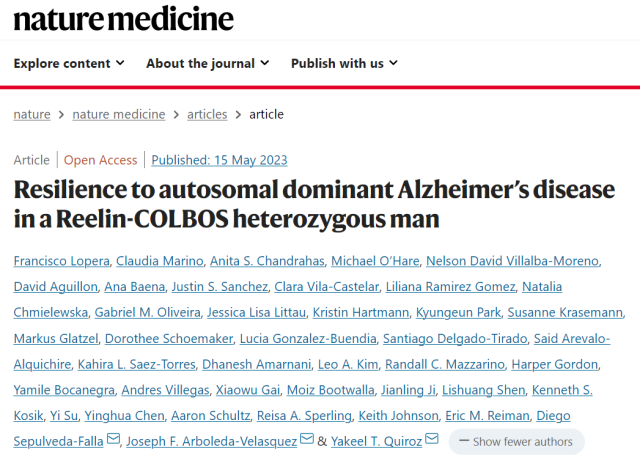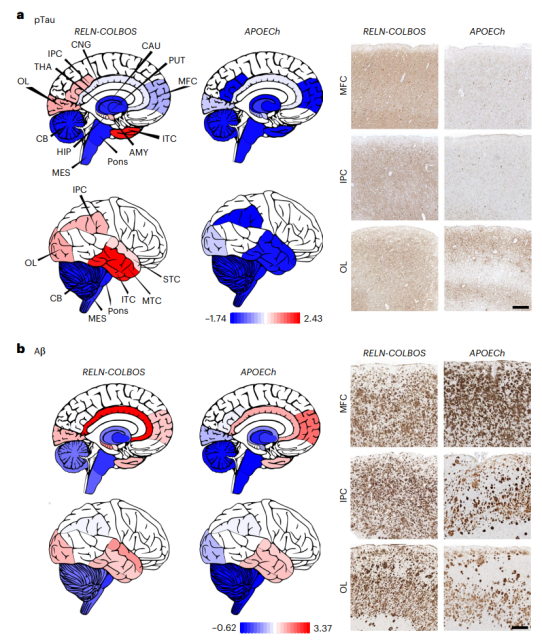Only 2 people can naturally resist Alzheimer’s disease in the world
- Normal Liver Cells Found to Promote Cancer Metastasis to the Liver
- Nearly 80% Complete Remission: Breakthrough in ADC Anti-Tumor Treatment
- Vaccination Against Common Diseases May Prevent Dementia!
- New Alzheimer’s Disease (AD) Diagnosis and Staging Criteria
- Breakthrough in Alzheimer’s Disease: New Nasal Spray Halts Cognitive Decline by Targeting Toxic Protein
- Can the Tap Water at the Paris Olympics be Drunk Directly?
Only 2 people can naturally resist Alzheimer’s disease in the world
- Should China be held legally responsible for the US’s $18 trillion COVID losses?
- CT Radiation Exposure Linked to Blood Cancer in Children and Adolescents
- FDA has mandated a top-level black box warning for all marketed CAR-T therapies
- Can people with high blood pressure eat peanuts?
- What is the difference between dopamine and dobutamine?
- How long can the patient live after heart stent surgery?
Only 2 people can naturally resist Alzheimer’s disease in the world.
Naturally resist Alzheimer’s disease, only 2 people have been found in the world, will they be the key to human beings to overcome Alzheimer’s disease?
Alzheimer’s disease (AD) , commonly known as “senile dementia”, is a type of degenerative disease of the central nervous system that mainly occurs in the elderly and is characterized by progressive cognitive dysfunction and behavioral impairment.
Currently, about 50 million people worldwide suffer from Alzheimer’s disease. As the average human life expectancy increases and the aging society intensifies, the prevalence of Alzheimer’s disease is also rising. It is estimated that by 2050, the number of patients with Alzheimer’s disease will increase to more than 150 million.
Alzheimer’s disease can be divided into early-onset Alzheimer’s disease (EOAD) and late-onset Alzheimer’s disease (LOAD) according to the age of onset .
The former usually occurs between 30-50 years old and does not exceed 65 years old. , while the latter develops after the age of 65. EOAD is characterized by familial inheritance and is usually associated with mutations in three genes, APP , PSEN1 , and PSEN2 . The APOE4 gene exists in 40%-50% of LOAD patients .
In addition to the above-mentioned genes that increase the risk of Alzheimer’s disease, there are some rare gene mutations that can prevent Alzheimer’s disease.
On May 15, 2023, Nature Medicine published a research paper entitled: Resilience to autosomal dominant Alzheimer’s disease in a Reelin-COLBOS heterozygous man .
The study reports a very specific case of a patient carrying a mutation in the PSEN1 gene that causes early-onset hereditary Alzheimer’s disease , which would normally occur between the ages of 30 and 50 However, his cognitive abilities remained intact until the age of 67.
The research team further identified a new rare mutation of the RELN gene in this patient, the RELN H3447R mutation (RELN-COLBOS) , which can prevent Alzheimer’s disease.
Discovering the world’s second human with an innate resistance to early-onset hereditary Alzheimer’s disease, this study reveals a previously unknown molecular pathway that may give people at high risk of Alzheimer’s disease the ability to recognize The resilience of cognitive decline points out a new direction for the development of drugs for Alzheimer’s disease.

Dr. Francisco Lopera of the University of Antioquia in Colombia discovered a special family many years ago. The family members carried a special gene mutation – PSEN1 E280A mutation .
People who carry this gene mutation usually develop mild cognitive impairment at the age of 44.
Cognitive impairment, dementia occurred at the age of 49, and died of dementia complications at the age of 60. Dr. Francisco Lopera has been following the family for the past 30 years.
The research team reported a woman in the family in 2019 who also carried the PSEN1 E280A mutation, but did not experience cognitive impairment until she was in her 70s.
The test results showed that she also carried a rare gene mutation – APOE3 Christchurch mutation (APOECh) .
And in this Nature Medicine paper, the research team found a man carrying the PSEN1 E280A mutation, whose cognitive ability was still intact at the age of 67 , mild dementia symptoms did not appear until the age of 72, and then died at the age of 74, This was decades later than other individuals in the family with the PSEN1 E280A mutation had onset.
But he did not carry the APOECh mutation. Further analysis revealed a rare mutation in his RELN gene (which expresses the Reelin protein) — the RELN H3447R mutation (RELN-COLBOS) .
The research team further compared these two particular patients and found that both had widespread and massive amyloid pathology in their brains, which is a hallmark of Alzheimer’s disease.
But there is limited accumulation of tau in the entorhinal cortex , a brain region typically affected by the early clinical stages of Alzheimer’s disease, which may be an important target for Alzheimer’s disease therapy.

Brain distribution of Alzheimer’s disease markers in these two patients
Reelin is a protein that plays a key role in the regulation of brain cell development and function.
In fact, previous reports have linked Reelin mutations to disorders such as autism, schizophrenia, epilepsy, and bipolar disorder, in which the Reelin protein is mutated at a loss of function.
In the study, the Reelin protein had mutations that enhanced its function.
The research team further verified the protective effect of this gene mutation in mouse models and neuropathology.
 RELN-H3448R homozygous mice activate the pDab1 signaling pathway, reduce the hyperphosphorylation of Tau protein, and have stronger exercise ability
RELN-H3448R homozygous mice activate the pDab1 signaling pathway, reduce the hyperphosphorylation of Tau protein, and have stronger exercise ability
The research team describes the Reelin protein as a “cousin” of the better-known APOE protein.
The mutated APOE and Reelin proteins from these two particular patients are involved in protection against Alzheimer’s disease, functioning as ligands for general cell receptors.
This may imply that there may be a common mechanism for Alzheimer’s disease tolerance, which is to inhibit the accumulation of tau protein by activating a specific signaling pathway, thereby delaying the cognitive decline of patients.
These findings reveal a previously unknown molecular pathway that may confer resilience to cognitive impairment in people at increased risk of Alzheimer’s disease and point to a new direction for the development of drugs for Alzheimer’s disease .
Dr. Francisco Lopera said that the discovery of these two special patients is very exciting.
Mother Nature did a special experiment on them, giving them a gene that causes Alzheimer’s disease, and at the same time giving them A gene that makes them resistant to Alzheimer’s disease.
This brings new insights into how we develop treatments for Alzheimer’s disease, opening the door to how we can prevent and treat this incurable disease.
Paper link :
https://www.nature.com/articles/s41591-023-02318-3
Only 2 people can naturally resist Alzheimer’s disease in the world
(source:internet, reference only)
Disclaimer of medicaltrend.org
Important Note: The information provided is for informational purposes only and should not be considered as medical advice.



